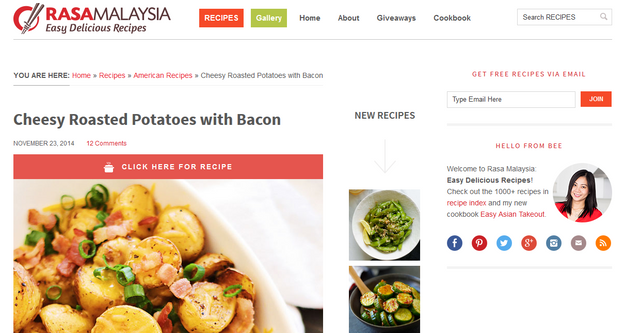Photo Cheetahs and Proposed Best Practices for Crediting Photos in #food
Uncredited Photos
I've noticed a few popular posts, specifically in the food section, with multiple delicious looking photographs this week that made me question their source. Sure enough a quick google reverse image search (https://images.google.com/, then click on the camera) confirmed they are from existing personal blogs, stock photo sites or magazines.
This photo of potatoes for, which appeared as the cover photo for a popular food post last week, is from a lady's personal blog.

While the Steemit author is doing work to find photos appropriate to their work, download them, post their own link to them, I don't think this is a best practice for posts for which money are made. On other platforms like pinterest, sharing and organizing photos can benefit both the poster and original content owner as viewers can trace content back to their creators. However, when nothing is said about a source, it is usually assumed it is the author's content and thus I would say it is plagiarism. I can imagine the original food blogger would be very surprised to see hundreds of dollars made on a post with their content when it is likely their original post made them much less is in ad revenue, if any.
I propose we as curators...
So far my response has been ( example https://steemit.com/food/@kaylinart/hack-for-potatoes#@andrewfoodist/re-kaylinart-hack-for-potatoes-20160821t153123913z) to simply post what seems to be the original link and politely ask the author to add a photo credit. This could be along with the photo, at the end of the post or however the author sees fit. This is a bit awkward since the edit function expires on steem posts, but authors can always add credit as a reply after the fact if they wish.
I invite you to join me in sharing sources!
I propose we as authors...
I understand there are times we wish to add a photo or graphic we can't take ourselves to illustrate . I propose these are the steps we try to exhaust in that case.
- Use royalty free images where possible.
I recommend https://pixabay.com/ which has a great selection and user interface.
If you expect to make profit off of your post, consider paying for professional stock images. Most popular authors KNOW they are going to make >$100 on a post, so licensing great photos for $1-15 is very justifiable.
Share sources of photos below the photo, at the end of a post or in the comments in you missed the post edit deadline. I propose we try to do this in a way that benefits the original photo owner easily such as a link to their site or compliment of their content.
Conclusion
Steemit publicly display the monetary earnings of all posts. This will eventually attract attention to plagiarism on this platform, so we should try to be as pro-active as possible in reducing it.
This is a good point and it has been made multiple times before. Since people make money directly from their posts they should not be using other people's photos without their permission. The solution is to use public domain, creative commons or stock images (which you have to pay for). In each case it should be made clear what the source is (if required by the license) as well as whether the image is public domain, CC or stock.
Didn't see it elsewhere, thanks.